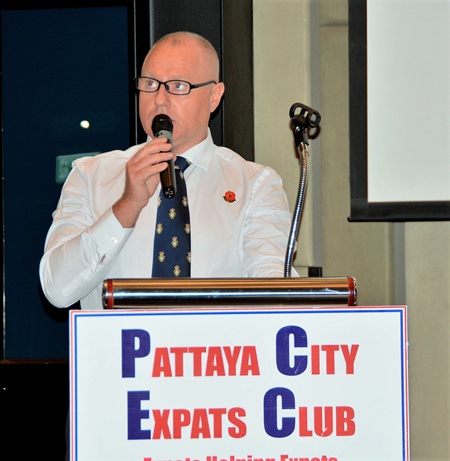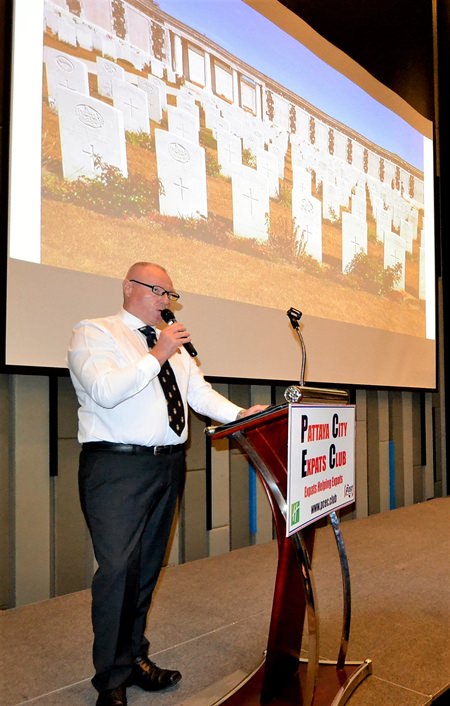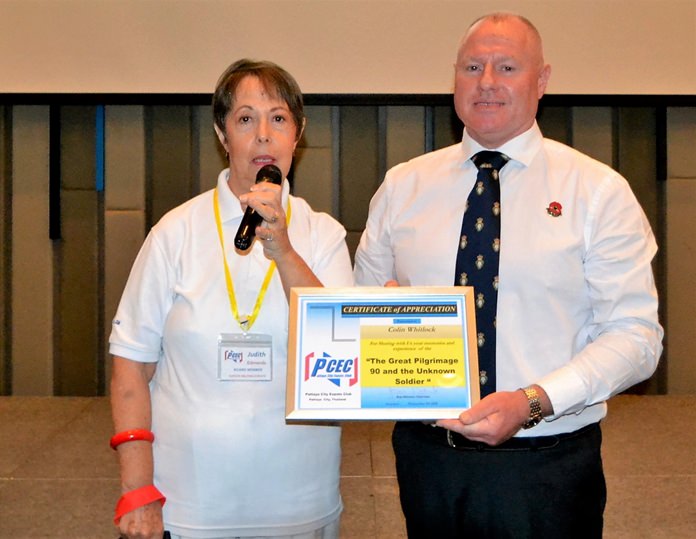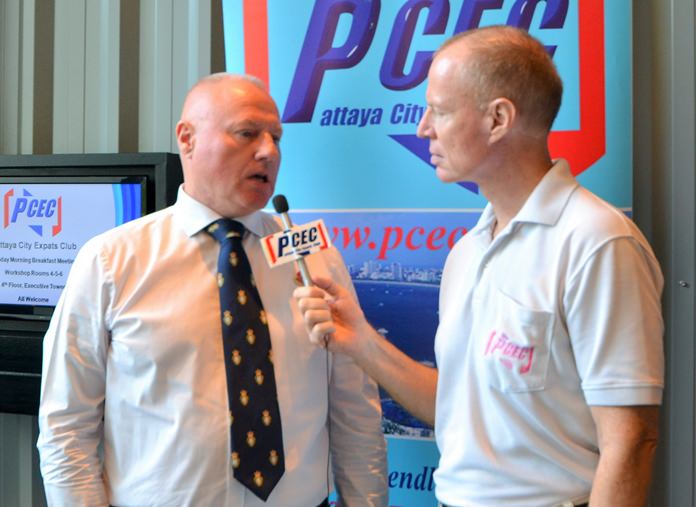
100 years ago, on the 11th of November 1918 the First World War – The Great War – the War to end all Wars – came to an end, and throughout 2018 major commemorative events are taking place to undertake remembrance and reflection upon those events.
Ten years after the armistice, the then British Legion organized for 11,000 veterans and war widows to visit the battlefields of the Somme and Ypres before marching to the Menin Gate on 8 August 1928. In 2018, exactly 90 years on, Great Pilgrimage 90 (GP90) saw 1,150 branches of the Royal British Legion and thousands of members and representatives from the UK and abroad help recreate their original pilgrimage. Colin Whitlock was one of the representatives from Royal British Legion Thailand to take part in that Pilgrimage and spoke about his experience at the November 4 meeting of the Pattaya City Expats Club (PCEC).

In a moving presentation, and at times with a very emotional impact on the audience, Colin described his participation in the GP90 and visits to the battlefield cemeteries and memorials in France and Belgium. The sheer scale of conflict remains hard to fully comprehend, with over 23,000 cemeteries in 150 countries, and with an estimate 41 million total military and civilian casualties. Nobel Peace Laurate Albert Scheitzer said that ‘The Soldiers’ graves are the greatest preachers for peace’.
Colin then went on to share his personal family connection with the casualties of World War I and so bring a human face to the realities and impacts of the conflict on society throughout Europe, the Commonwealth and North America. In a war that saw the introduction of major technologies such as radio and mechanized vehicles and armaments, including the use of chemical weapons, the development of what was to become an industrial war, became industrial scale slaughter and remains one of the deadliest conflicts in history.
The very moving pictures of cemeteries from both sides of the conflict with grave markers extending as far as the eye can see, struck a very somber tone. Again, in order to bring the reality of the impact of the extent of the conflict, Colin used reference to the satirical British TV drama Blackadder. Amazingly, although it was intended as a comedy/satirical program, so the chosen names for the characters were entirely fictional, so widespread was the extent of casualties that an actual Captain Blackadder, a Private Baldrick, a Lieutenant George, and a Captain Darling did all serve in WW1.
Colin then continued to relate the story of the Tomb of the Unknown Warrior (UK) whose grave resides in Westminster Abby in the UK and is often referred to as the Tomb of the Unknown Soldier. Beneath this stone rests the body of a British warrior, unknown by name or rank, brought from France to lie among the most illustrious of the land and buried on Armistice Day. It is still little known that all royal brides in the UK, since 1923, place their wedding bouquets on the Tomb of the Unknown Soldier the day after their wedding as an act of remembrance.
Colin then asked the meeting to stand and join him in an Act of Remembrance for the fallen.
In questions a query was raised on the identification of human remains from the conflict which are still being found to this day. The Commonwealth War Graves Commission (CWGC) advises: “The discovery of human remains … in former battlefield areas still occurs. Although it is not usually possible to identity the casualty, if artefacts and historical information suggest a particular regiment/unit or a named individual, every effort is made by the military authorities to trace present day relatives and, where appropriate, carry out DNA testing. Whether identification is successful or not, the casualty is reburied in a CWGC cemetery close to where they were found and we mark their grave with a headstone.”
Colin was warmly thanked by the PCEC for a most moving presentation.

After his presentation, MC Judith Edmonds brought everyone up to date on upcoming events and then turned it over to the Open Forum portion of the meeting where questions are asked and answered and comments made about Expat living in Thailand, Pattaya in particular. For more information about the PCEC and their activities, visit www.pcec.club.





